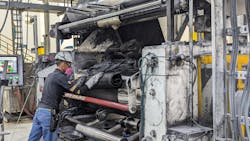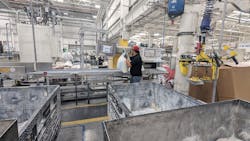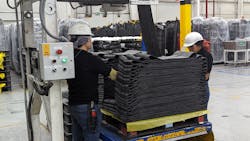2023 IndustryWeek Best Plants: Cleanliness Reflects Excellence at Cooper Standard Mixing Aguascalientes
Nestled 200 miles (as the crow flies) east of the Pacific and nearly 300 miles west of the Atlantic, Cooper Standard Mixing Aguascalientes in central Mexico isn’t typically at risk for hurricanes or floods. But, every member of the plant’s senior management can tell you what storms are brewing in the Gulf of Mexico.
“It’s the biggest threat we face in late summer,” says plant manager Rodolfo Munoz. “We’re always paying attention to anything happening in Texas or Louisiana. So many of our raw materials come from there, we have to be ready to react during every storm season.”
Cooper Standard Mixing Aguascalientes
Location: Aguascalientes, Mexico
Employees: 88
Primary Product: EPDM (Synthetic rubber)
Startup Date: 2019
Achievements: Two lost-time accidents in the past four years, company awards for quality and productivity including plant of the year Americas region for the last three years, significantly lower employee turnover than regional competitors and plants in the United States, set standards and supported Canadian plant for a new mixer change.
The irony: Cooper Standard decided to vertically integrate synthetic rubber production to protect its supply chain for automotive hoses and window seal components. Company executives say insourcing rubber mixing gives them more control over their most important materials, but it’s also made everyone far more aware of how difficult it can be to source polymers from Gulf Coast refineries.
Still, “100% this was the right call for us, 200%,” says Cooper Standard Vice President of Operations Carlos Montiel. “I think the supply chain exposure, which was constant, and managing suppliers and economic exposure, getting control of both of those really has been able to cement mixing into something of a competency for us.”
Managers can’t control the weather, but they can plan to address its challenges. Nearly everything else at the plant—from keeping employees loyal to keeping them safe to minimizing cycle times to ensuring quality—they can control. And how well they manage those issues is why Cooper Standard’s plant on the south side of Aguascalientes is one of only two winners of 2023’s IndustryWeek Best Plants Award.
Keeping It Clean
The IW Best Plants program evaluates operations on a wide range of metrics including safety, technology spending, inventory management, continuous improvement efforts and product quality. To win, companies have to excel at a little bit of everything, not simply be highly productive or profitable.
Cooper Standard’s clean floors involved commitments from its material handling, continuous improvement, technology, safety and production teams.
Engineers designed a vacuum-driven delivery system to carry the carbon black to the plant’s two giant mixing machines, keeping the material as contained as possible. Production and material handling employees made work-change recommendations to further isolate the bulk black powder. And enforcing those policy changes are safety teams.
“Synthetic rubber is a very dirty process, so you have to focus a lot of effort on cleaning,” says Javier Moreno, process engineer lead at the plant, a role that includes driving continuous improvement efforts. “We have weekly 6S audits that help us keep a focus on cleanliness.”
Cleanliness also supports process improvements. At every step of mixing, employees use labels with QR codes. The plant produces dozens of varieties of synthetic rubber, so mix recipes have different ingredient lists. One set of employees portions and weighs each ingredient and affixes the QR-coded labels. When mixing employees use those pre-portioned ingredients, they scan the batch and weigh it again to ensure that the numbers match. Both processes would be more difficult in a dirty environment where dust particles could cloud camera lenses.
Employee Engagement
The focus on cleanliness even addresses one of the biggest challenges facing manufacturing worldwide—employee turnover. The Aguascalientes facility posted a 16.5% turnover rate last year. While a fairly high figure historically, that’s well below the 26.2% figure posted by the Manufacturer’s Alliance for U.S. labor turnover (and U.S. turnover rates are typically much lower than Mexican rates).
Labor turnover was a huge issue for nearly all IW Best Plants applicants in 2022, as last year included the massive increase in people voluntarily quitting their jobs—aka The Great Resignation.
Munoz says like many manufacturers, Cooper Standard offers incentives for employees who suggest safety or process improvements. Every suggestion earns an employee five points, points that can be spent to buy prizes. Instead of Cooper Standard hats or other swag, prizes include computers, dishes, cleaning supplies—practical items that everyone can appreciate and use.
The best suggestion, as rated by managers, allows the employee to choose anything from the prize list. For 2022, the winner suggested material handling changes to further isolate carbon black. In addition to getting the top prize last year, Munoz said the employee with the best suggestion also won a promotion to supervisor.
Other employee-engagement strategies include productivity contests between shifts, with the winning group getting a party with non-cafeteria food for lunch once per quarter, community volunteer days and continuous training opportunities.
Moreno adds that most employee suggestions relate to safety, not productivity, but the two feed each other. In the past four years, the plant has had only two lost-time accidents, one in 2019 and another in 2021. He adds that safety is top of mind for managers because rubber mixing can be dangerous, especially as the rubber moves from the mixers to the mills.
The mills use two large rotating drums to roll the glob of hot, soft rubber to a uniform thickness. It’s a manual process with a lone employee standing in front of the machine, touching the hot material with gloved hands, guiding it around the drums and eventually cutting it into strips. In addition to machine safety systems (such as metal bars to keep workers from getting too close to the rotating drums and kick-activated shutoff systems), the whole plant trains for worst-case scenarios. Once a year, Moreno throws a dummy into the rollers to test how well the team follows safety protocols.
Investing in Technology
The Aguascalientes plant may be new, but almost all of the mixing equipment, conveyor systems, scales and other gear came from existing facilities. Montiel said getting into rubber mixing in a cost-effective way was critical, so Cooper Standard didn’t write a blank check for brand-new everything. Instead, it invested strategically in controls and other systems.
A good portion of that investment went into developing the Local Mixing Operating System (LoMOS), a system that controls the mixing machines, tracks weights of materials flowing into the mixers (thanks to embedded sensors in the equipment and those ubiquitous QR codes), stores recipe data and constantly analyzes cycle times, production volumes and material properties – post-production, quality test employees check each batch for material property performance (obviously using QR-code tracking), tying test performance back to each individual batch mixed on the machines.
Kaushik Shah, a SCADA developer at Cooper Standard’s offices in Canada, says LoMOS manages processes and generates a digital twin that engineers in Mexico, the U.S. and Canada reference to track progress.
“Because we have a rich history of data, this is possible for us to manage from a unified HMI. It allows us to maximize output and reduce scrap through tight process control,” Shah says.
AI process tools can then suggest tweaks to recipes—possibly a different target temperature or a change to raw material ratios. Those changes could lead to shorter cycle times or new rubber formulations with special properties.
Munoz says the plant’s success (winning internal company quality recognitions for the past several years), doesn’t come down to any one thing. It requires chasing excellence in safety, technology, quality and productivity.
“We’re at the center of everything for the company,” Munoz says, referring to the massive number of automotive parts that Copper Standard makes. “If the rubber is good, everything else will flow from that.”
About the Author
Robert Schoenberger
Editor-in-Chief
LinkedIn: linkedin.com/in/robert-schoenberger-4326b810
Bio: Robert Schoenberger has been writing about manufacturing technology in one form or another since the late 1990s. He began his career in newspapers in South Texas and has worked for The Clarion-Ledger in Jackson, Mississippi; The Courier-Journal in Louisville, Kentucky; and The Plain Dealer in Cleveland where he spent more than six years as the automotive reporter. In 2014, he launched Today's Motor Vehicles (now EV Manufacturing & Design), a magazine focusing on design and manufacturing topics within the automotive and commercial truck worlds. He joined IndustryWeek in late 2021.



